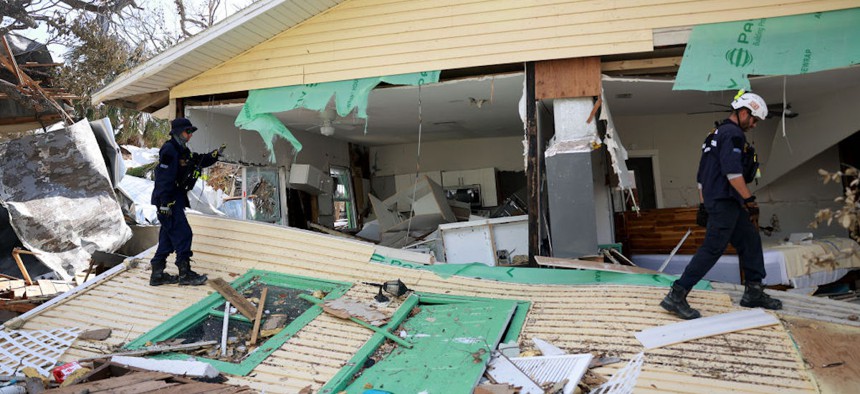Cloud-based property assessments speed hurricane recovery

Members of the City of Miami Florida Task Force 2 Search and Rescue team check homes for victims in the wake of Hurricane Ian on October 3, 2022 in Fort Myers Beach, Florida. Joe Raedle/Getty Images
Cities and counties that suffered damage from Hurricane Ian could access Accela’s damage assessment service to jump-start recovery.
Disaster-affected communities can use a cloud-based property assessment tool to jump-start recovery.
Accela most recently made its Rapid Damage Assessment Cloud Service available to cities and counties in Florida affected by Hurricane Ian, one of the most destructive storms to hit the state. RDA helps in several ways, said Amber D’Ottavio, vice president of product management at Accela.
First, it assists with windshield surveys, a visual inspection of properties made from a vehicle. For example, if an entire block was under 6 feet of water, there is an assumed level of damage, D’Ottavio said. “That’s really important because that information then is reported to [the Federal Emergency Management Agency], and then that’s how the city can get the funds and resources for recovery as quickly as possible,” she said.
The service can also be used with more detailed property and infrastructure inspections and comes with physical and digital placarding, so inspectors can post signs indicating whether a structure is safe to enter.
“That information, as well as the windshield survey information, can be posted to the public,” D’Ottavio said. That’s especially useful to residents who have been displaced, because they can go online to see if they can safely return to their homes.
To use the tool, cities and counties do not have to have any foundational technology, but it is helpful if they have geographic information system (GIS) data on hand.
“If they have that in place, it makes the process much easier because it just goes to a map and you can just draw a polygon around the entire lot and process things really quickly,” D’Ottavio said. “Let’s say I have 30 inspectors to go out there and do this work. I could just select a whole area of the city and say, ‘OK, this is your zone, this is your zone, this is your zone.’ It automatically schedules the inspections and brings over all of the property information that’s stored in the system. That will just make the whole process more automated.”
If a jurisdiction doesn’t have that data at the ready, third parties do. In fact, Accela acquired it at no charge from companies after Hurricane Harvey hit Texas in 2017.
Accela has offered RDA – or a form of it – for years. For instance, when Hurricane Katrina struck in 2005, New Orleans already had an Accela permitting and inspection system, and the company sent team members to assist city officials on the ground.
“We went down there and said, ‘What do you need?’ and they said, ‘We need this windshield survey,’ ‘We need to report this data,’” D’Ottavio said. Accela workers in the field could call the command center and ask employees there to reconfigure the system on-the-fly to adapt to local needs.
As a result, they processed about 120,000 inspections in a few weeks, she said. Accela estimates that inspectors moved five times faster than they could using paper-based processes, which were standard at the time.
It became apparent that having a solution in place that could speed all of these initial inspections would aid in recovery, she added, especially because the work had largely been paper-based or done using Microsoft Excel spreadsheets, which makes reporting to FEMA more manual.
RDA evolves each time it’s deployed. “Each kind of disaster has its own unique needs,” as do regions, D’Ottavio said. “We’ve worked with Texas and Florida and California and New Orleans, and each of those times we were able to gather more information and then incorporate that into the solution so that it’s ready to go, [because] if this worked last time, it should work again.”
The technology could be used with disasters besides hurricanes, including floods and fires, and it remains free to use until all inspections are done and the city or county is ready to move into the permitting and rebuilding phase. It’s free to any jurisdiction, not just existing Accela customers.
The software is available at nonemergency times, too, but with associated fees. If customers already use Accela’s building permitting solution, the licensing for RDA is free. “There’s usually some cost to implement it, to get it up and running so that it meets their specific needs,” D’Ottavio said, such as customizations or mapping to GIS. “But during a disaster, we want to make sure cities have what they need, so it’s free.”
Stephanie Kanowitz is a freelance writer based in northern Virginia.





